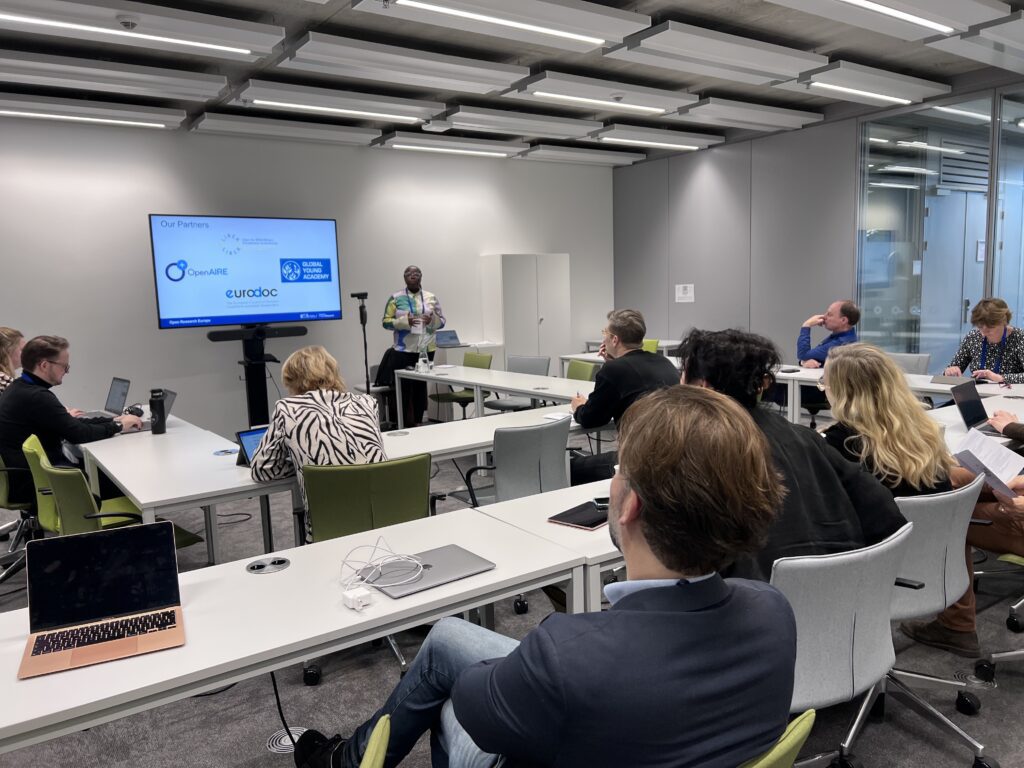Our first in-person Winter Event opened the stage for LIBER’s Working Groups and projects members to present and discuss their work in depth, and to host energetic workshops and sessions.
The publishing platform Open Research Europe (ORE) is a project in which LIBER is a partner. The project was the subject of two sessions. The first was an introduction of the platform and a discovery on how it could be promoted through libraries. The afternoon session explored the current challenges in transforming the peer review into a new, open, and transparent process that truly enhances the quality of scholarly publications.
Lighting Talk: How the Open Research Europe Publishing Model Promotes Community
Georgina Durowoju, Content Acquisition Editor at ORE and F1000, began her session with a confident introduction of the open publishing platform. Funded by the European Commission (EC), the project publishes research exclusively funded by Horizon 2020, Horizon Europe and Euratom, in all subject areas.
Why would a researcher want to publish with ORE? Aside from being free, it’s relatively fast. It can take about 96 days from submission to publication after passing peer review. All research outputs are considered, in any field, which makes the platform, and ORE’s ethos, inclusive. The platform meets all Open Access sharing requirements and offers a completely transparent peer review process.
The lighting talk continued toward a discussion period. How can libraries be involved in promoting ORE to their communities? Promotion is always challenging. ORE could reach out directly to the specific research groups to raise awareness, suggested one attendee. Grant officers should be involved in the publishing process and its direction from the beginning, mentioned another. To deliver on their promise of being transparent, ORE could make available data and reports on their publications to librarians, was a third suggestion. The discussion closed with plenty more suggestions.

Workshop “Investing in Open Peer Review”
In the afternoon Open Peer Review workshop that followed, Georgina gave an accurate picture, through examples and indicators, of how ORE works. The workshop, moderated by LIBER Vice President Giannis Tsakonas, was inspired by the development of the Open Peer Review (OPR) model behind ORE and explored how both authors and researchers can benefit from it.
Tony Ross-Hellauer, leader of the Open and Reproducible Research Group and Senior Researcher at TU Graz and Know-Center, presented “Peer Review in the Age of Open Science.” He showed key definitions of peer review and open peer review from a systematic study on the topic. He also provided a critical reflection of the advantages and disadvantages of the current system and presented implementation practices of the current uptake of OPR. One takeaway was that we need more evidence on what works and how effective it is.
In her presentation, “Publishing with peer review – Will the future require us to open up the black box of peer assessment?” Sofie Wennstrom, analyst at the Stockholm University Library and Chair of LIBER’s Open Access Working Group, highlighted the inefficiencies of the current peer review system. She further presented the work that SU Press, an OA publishing initiative under the SU Library, is doing to facilitate openness in its reviewing processes. She also addressed the role of libraries in supporting infrastructures, including the ones that facilitate OPR, that help the progress of openness in scholarly communication.
After the presentations, Tony, Sofie and Georgina explored the rewarding and compensating of reviewers and developing their skills toward OPR, as well as using reviews on pre-print servers and overlay journals. A discussion on how research libraries can support OPR concluded the workshop.
Do you want help authors, researchers and reviewers engage with ORE? Take a look at the ORE website.
Take a look at the speakers’ slides from this workshop at many more at the Winter Event, here.